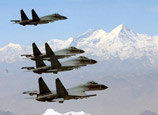
China's escort fleet in Gulf of Aden, Somali waters makes significant contribution
On March 25, one month after leaving Qingdao, Shandong province, Captain Wang Haijiang felt a bit more excited than usual. "Pirates had finally appeared," he recalled.
"There were five batches of pirates harassing the fleet, but we, as part of the well-trained Chinese navy, were confident and would never be intimidated, even if war broke out," the chief of the missile destroyer Qingdao, from the North Sea Fleet, told China Daily.
On Wednesday, the People's Liberation Army navy observed the fourth anniversary of sending escort fleets to the Gulf of Aden and Somali waters.
Wang has every reason to be confident.
From February to September, the 11th escort fleet, with three ships and a crew of 800 from the North Sea Fleet, escorted 184 vessels, and inspected and drove away 126 suspicious ships in the area.
Over the past four years, the PLA navy has provided 13 groups with 34 warships, 28 helicopters and nearly 10,000 military men as escorts. More than 5,000 ships from China and the rest of the world were successfully protected.
The escort helped China to increase its anti-piracy capability and helped make the Gulf of Aden and Somali waters a safer place, experts said.
Improved capabilities
The Chinese navy has made an important contribution to the sharp decline in piracy over the past four years, said Zhang Junshe, deputy director of the Naval Military Studies Research Institute.
Somali pirate attacks fell to 70 in the first nine months of this year, compared with 199 incidents in 2011. It was the lowest number in three years as tougher navy action and private armed security teams deterred gangs, the International Maritime Bureau said in October.
There has not been a successful hijacking of a merchant vessel off Somalia in the second half of this year, Reuters quoted outgoing commander of the NATO mission, Ben Bekkering, as saying this month.















 China sends first oceangoing patrol vessel to South China Sea
China sends first oceangoing patrol vessel to South China Sea


![]()
